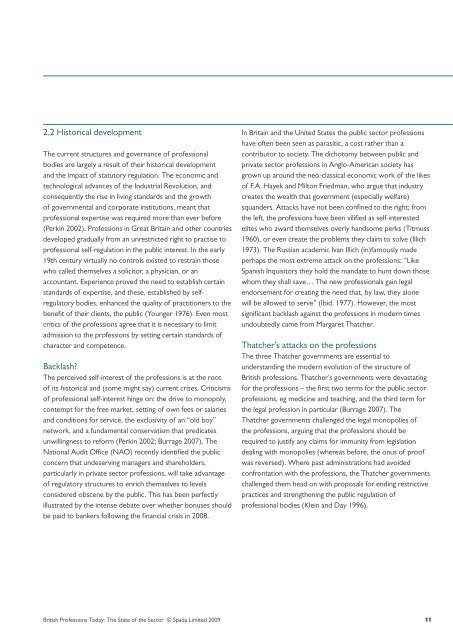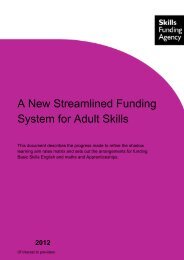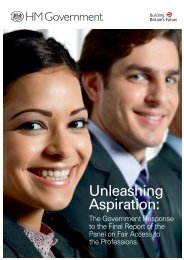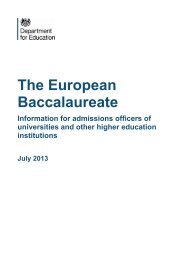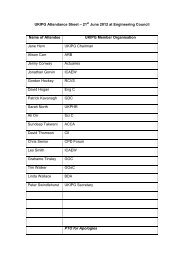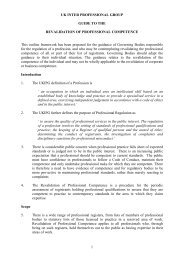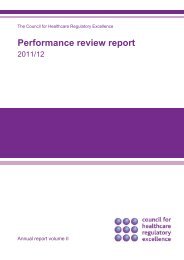BRITISH PROFESSIONS TODAY: THE STATE OF ... - Property Week
BRITISH PROFESSIONS TODAY: THE STATE OF ... - Property Week
BRITISH PROFESSIONS TODAY: THE STATE OF ... - Property Week
You also want an ePaper? Increase the reach of your titles
YUMPU automatically turns print PDFs into web optimized ePapers that Google loves.
2.2 Historical development<br />
The current structures and governance of professional<br />
bodies are largely a result of their historical development<br />
and the impact of statutory regulation. The economic and<br />
technological advances of the Industrial Revolution, and<br />
consequently the rise in living standards and the growth<br />
of governmental and corporate institutions, meant that<br />
professional expertise was required more than ever before<br />
(Perkin 2002). Professions in Great Britain and other countries<br />
developed gradually from an unrestricted right to practise to<br />
professional self-regulation in the public interest. In the early<br />
19th century virtually no controls existed to restrain those<br />
who called themselves a solicitor, a physician, or an<br />
accountant. Experience proved the need to establish certain<br />
standards of expertise, and these, established by selfregulatory<br />
bodies, enhanced the quality of practitioners to the<br />
benefit of their clients, the public (Younger 1976). Even most<br />
critics of the professions agree that it is necessary to limit<br />
admission to the professions by setting certain standards of<br />
character and competence.<br />
Backlash?<br />
The perceived self-interest of the professions is at the root<br />
of its historical and (some might say) current crises. Criticisms<br />
of professional self-interest hinge on: the drive to monopoly,<br />
contempt for the free market, setting of own fees or salaries<br />
and conditions for service, the exclusivity of an “old boy”<br />
network, and a fundamental conservatism that predicates<br />
unwillingness to reform (Perkin 2002; Burrage 2007). The<br />
National Audit Office (NAO) recently identified the public<br />
concern that undeserving managers and shareholders,<br />
particularly in private sector professions, will take advantage<br />
of regulatory structures to enrich themselves to levels<br />
considered obscene by the public. This has been perfectly<br />
illustrated by the intense debate over whether bonuses should<br />
be paid to bankers following the financial crisis in 2008.<br />
In Britain and the United States the public sector professions<br />
have often been seen as parasitic, a cost rather than a<br />
contributor to society. The dichotomy between public and<br />
private sector professions in Anglo-American society has<br />
grown up around the neo-classical economic work of the likes<br />
of F.A. Hayek and Milton Friedman, who argue that industry<br />
creates the wealth that government (especially welfare)<br />
squanders. Attacks have not been confined to the right; from<br />
the left, the professions have been vilified as self-interested<br />
elites who award themselves overly handsome perks (Titmuss<br />
1960), or even create the problems they claim to solve (Illich<br />
1973). The Russian academic Ivan Illich (in)famously made<br />
perhaps the most extreme attack on the professions: “Like<br />
Spanish Inquisitors they hold the mandate to hunt down those<br />
whom they shall save… The new professionals gain legal<br />
endorsement for creating the need that, by law, they alone<br />
will be allowed to serve” (Ibid. 1977). However, the most<br />
significant backlash against the professions in modern times<br />
undoubtedly came from Margaret Thatcher.<br />
Thatcher’s attacks on the professions<br />
The three Thatcher governments are essential to<br />
understanding the modern evolution of the structure of<br />
British professions. Thatcher’s governments were devastating<br />
for the professions – the first two terms for the public sector<br />
professions, eg medicine and teaching, and the third term for<br />
the legal profession in particular (Burrage 2007). The<br />
Thatcher governments challenged the legal monopolies of<br />
the professions, arguing that the professions should be<br />
required to justify any claims for immunity from legislation<br />
dealing with monopolies (whereas before, the onus of proof<br />
was reversed). Where past administrations had avoided<br />
confrontation with the professions, the Thatcher governments<br />
challenged them head on with proposals for ending restrictive<br />
practices and strengthening the public regulation of<br />
professional bodies (Klein and Day 1996).<br />
British Professions Today: The State of the Sector © Spada Limited 2009 11


